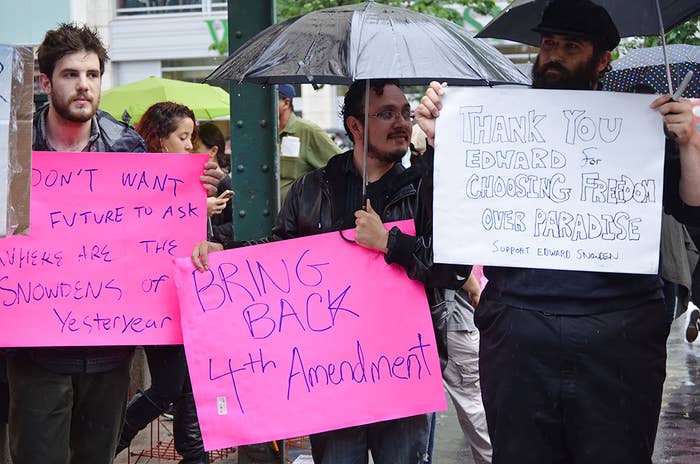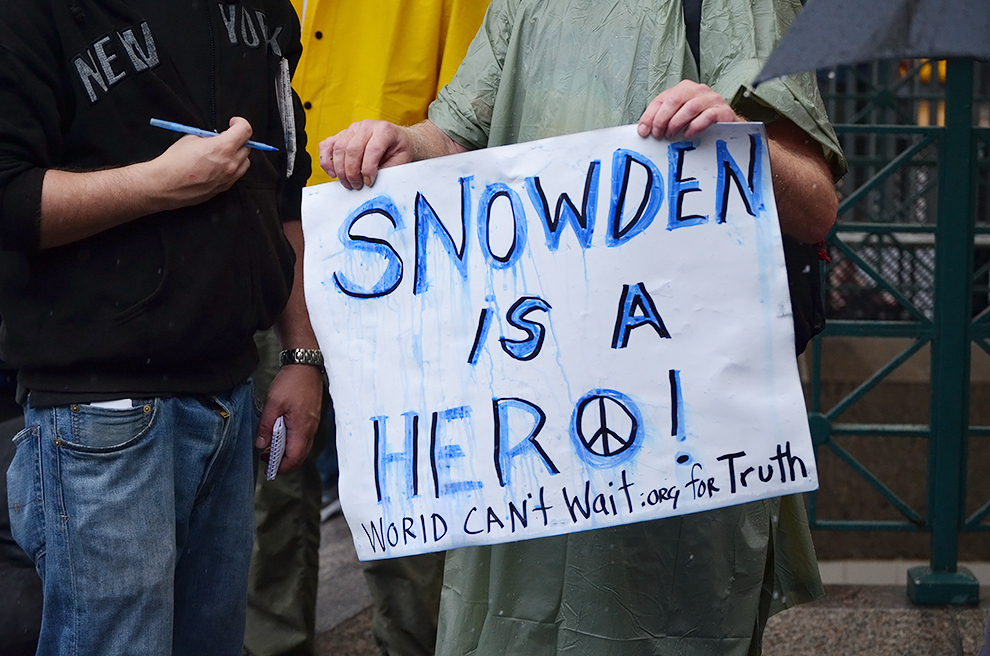
"I don't like being in the spotlight," Edward Snowden told The Washington Post from his Hong Kong hotel room on Sunday. Snowden, the 29-year-old NSA contractor who leaked top-secret government documents, told The Guardian he didn't want public attention. He didn't want the story to be about him.
But the 25 or so soggy supporters standing in Union Square on Monday didn't get that message. To them, the story is now all about Edward Snowden.
"Obviously no one wants to be a hero with that kind of fame, but he will be turned into that, whether he likes it or not," said Michael Anzuoni, a 22-year-old programmer who spoke to reporters outside during a rainstorm — a flood advisory, rather — for #IStandWithEdwardSnowden, an event organized just hours after The Guardian's Glenn Greenwald, Ewan MacAskill, and Laura Poitras published Snowden's confession.
"Obviously people shouldn't blindly follow whatever he does," Anzuoni said. "But I feel like he's a good example for what we're standing for."
And what this small group of demonstrators stood for Monday afternoon was transparency, privacy, and protection for whistle-blowers. (If those priorities sound familiar, it'll come as no surprise that the Snowden rally was organized in part by Yoni Miller of Occupy Wall Street.)
It's a movement that's never really had a vocal figurehead — except, to some degree, Bradley Manning, the Army private accused of leaking more than a half million classified government documents.
When asked by The Guardian if he saw himself as another Bradley Manning, Snowden didn't answer the question directly, only saying, "Manning was a classic whistleblower. He was inspired by the public good." Snowden's supporters, gathered in the rain, had a more firm opinion: Snowden isn't the next Manning. He's much more.
"[Manning] broke operational security by just blindly releasing a deluge of documents which contained secure information that could harm people," Anzuoni said. "With Snowden, it was carefully curated. The point wasn't to harm people."

The differences go on. Manning was exposed; Snowden came forward. Manning gave everything to Julian Assange's WikiLeaks, dropping his intel, unfiltered, like a bomb. Snowden gave everything to more mainstream journalists, trusting them to judge which of his documents could and should be published.
So far, the media coverage of both men has differed too. Here's how the conservative Glenn Beck described Manning's actions in 2010: "He was jilted by a boyfriend or something and... I don't know." And here's how Beck described Snowden on Sunday: "Real. Steady. Thoughtful. Transparent" and "I think I have just read about the man for which I have waited."
Snowden is the man these demonstrators — who mostly are ideologically revolted by Beck — have waited for too.
"I came out to let Edward Snowden know that we support him in America and we're very grateful for the revelations that he's exposed," said Claire Lebowitz, holding a sign that read "I <3 Manning + Snowden!"
"Right now the narrative is being drawn up that will dominate the rest of the narrative for the next year, the next 10 years," said Kenny Steven Fuentes, an actor and blogger. "The fact that there are people here means that we're not alone." He held a sign that read "Bring Back 4th Amendment."
Activist Chuck Nasmith drove three hours to be at the demonstration. After he read the Guardian story on Sunday, he thought, "We have another hero." One side of his sign read "Obama, Can You Hear Me Now?" The other side read "Snowden Is A Hero," with a peace sign in the O.
This isn't what Snowden said he wanted. But as Anzuoni said Monday, umbrellaless in the downpour, "A figurehead is important … Every sort of big revolutionary action needs a human element for it to resonate."

